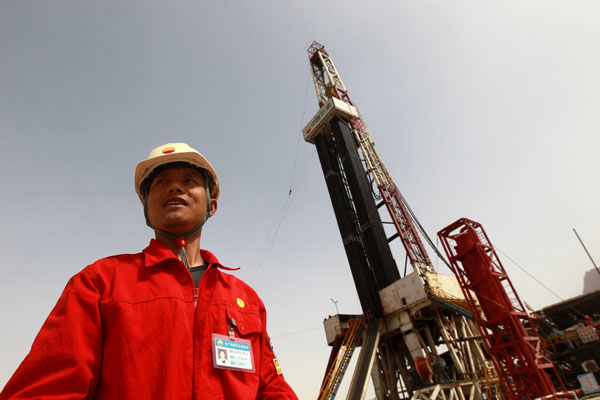The forgotten town of black gold
Updated: 2013-05-14 09:51
By Cui Jia (China Daily)
|
||||||||
Editor's note: This is the seventh in a regular series of reports brought together under the banner "Lost Horizons", which aim to show life in the less-reported areas of the country and to give a voice to those whose words often go unheard. Slideshows and video footage are also available at www.chinadaily.com.cn/video
Yiqikelike's heyday has long passed, as Cui Jia reports from Kuqa county, Xinjiang Uygur autonomous region.
 |
|
Li Xuelin, manager of an oil drilling platform near Yiqikelike, a former oil town that is almost deserted, says he rarely visits the place. [Photo by Cui Meng / China Daily] |
A truck laden with equipment for oil rigs bounced along a dried riverbed dotted with huge red wind- and rain-scarred rocks for hours until the ruins of a town suddenly emerged from the barren land.
The broken walls became visible as the dust clouds raised by the truck finally settled in the Tarim Basin of the Xinjiang Uygur autonomous region.
Yiqikelike in Kuqa county was once a thriving oil town; in 1958 the first drops of crude were extracted from the Tarim basin, one of China's largest natural reserves of oil and natural gas at the time. Thirty years later, when the resources were exhausted or extraction had become too expensive, the town was all but abandoned.
Over the years, the sand-strewn wind has blown most of the roofs from the brick houses, leaving a few broken walls standing. It's hard to believe that Yiqikelike, which means "three Mongolian gazelles" in the Uygur language, hidden deep in the Tianshan Mountains, was once home to more than 20,000 people who labored night and day to extract the treasure buried beneath the streets.

Although the place is a ruin, some historical features are well preserved, including faded murals bearing quotations from Chairman Mao, which are just visible on the pockmarked walls. A tall monument stands in the center of the town square, but one can only speculate as to why it was built; all the images around its base have been eroded by the wind and sand and only a few fragments of yellow paint remain. It seems certain that nature will eventually wipe all trace of the town from the face of the earth.
Even in Yiqikelike's heyday, the poor state of the roads and the threat of flash floods during the summer months meant the residents were almost completely cut off from the outside world. In their self-sufficient way, they had a cinema, a school, a hospital and even a post office. These meager amenities provided almost all the residents' needs, according to Gao Bo, who was born and raised in the town.
"In 2006, I joined around 20 junior high school classmates and organized a reunion in the remains of the old school. We were all so emotional," said Gao who attended junior high school in Yiqikelike in 1976 when the city boasted more than 290 oil wells.

 Michelle lays roses at site along Berlin Wall
Michelle lays roses at site along Berlin Wall
 Historic space lecture in Tiangong-1 commences
Historic space lecture in Tiangong-1 commences
 'Sopranos' Star James Gandolfini dead at 51
'Sopranos' Star James Gandolfini dead at 51
 UN: Number of refugees hits 18-year high
UN: Number of refugees hits 18-year high
 Slide: Jet exercises from aircraft carrier
Slide: Jet exercises from aircraft carrier
 Talks establish fishery hotline
Talks establish fishery hotline
 Foreign buyers eye Chinese drones
Foreign buyers eye Chinese drones
 UN chief hails China's peacekeepers
UN chief hails China's peacekeepers
Most Viewed
Editor's Picks

|

|

|

|

|

|
Today's Top News
Shenzhou X astronaut gives lecture today
US told to reassess duties on Chinese paper
Chinese seek greater share of satellite market
Russia rejects Obama's nuke cut proposal
US immigration bill sees Senate breakthrough
Brazilian cities revoke fare hikes
Moody's warns on China's local govt debt
Air quality in major cities drops in May
US Weekly

|

|








